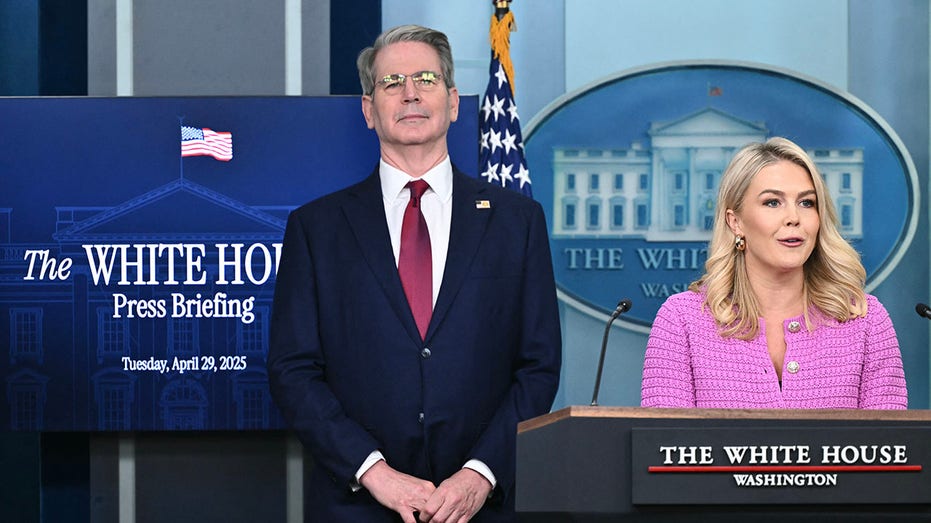EXCLUSIVE: A nonprofit organization that advocates for the protection of free markets is urging the Treasury Department to ensure any trade deals negotiated with the European Union (EU) remove “punitive” taxes, fines and regulations imposed on U.S. companies providing digital services, according to a letter obtained by Fox News Digital.
Public Policy Solutions sent a letter to Secretary of the Treasury Scott Bessent Wednesday morning claiming Europe’s digital service taxes are unfairly hampering U.S. companies like Alphabet, Apple and Meta — and favoring China instead.
The letter, which comes after the Wall Street Journal reported that the U.S. and EU are growing close to a trade deal on non-tariff trade issues, accompanies a report the group compiled aimed at serving as a “resource” during ongoing trade discussions and outlines specific policies the group claims are hindering U.S. companies like the E.U.’s Digital Markets Act and the Digital Services Act.
TRUMP SAYS CHINA AGREES TO ‘FULLY’ OPEN COUNTRY’S MARKETS TO US BUSINESSES
The Digital Markets Act singles out and imposes additional regulations on seven so-called “gate-keepers” of information: Alphabet, Amazon, Apple, ByteDance, Meta and Microsoft. The report noted that six of these companies are American, one is Chinese, and none are European.
The Digital Services Act, meanwhile, aims to crack down on illegal content and misinformation, but critics of the law, like Public Policy Solutions, claim it restricts free speech and point out it imposes stricter rules on larger companies that meet a certain threshold. Of the 19 companies that qualify as a very large online platform (VLOP), 15 are based in the U.S., unfairly targeting American companies, according to Public Policy Solutions.
“Europe’s digital service taxes are unfair and disproportionately impact the largest American tech firms while deliberately exempting smaller European competitors,” Public Policy Solutions Co-founder and president Joe Grogan said in the letter to Bessent. “These measures distort competition, fragment the global marketplace, and undermine the foundation for meaningful economic cooperation. Europe cannot impose targeted taxes on U.S. companies and also negotiate trade agreements in good faith without meaningful change to their tactics in this space.”
TRUMP SIGNALS CHINA ‘VERY MUCH’ INTERESTED IN SECURING TRADE DEAL AHEAD OF SWITZERLAND NEGOTIATIONS

Failure to comply with regulations in the Digital Markets Act results in fines. For example, the European Commission announced in April that it would fine Meta €200 million for violating the law, claiming Meta failed to provide consumers options to use less personal data.
Likewise, Public Policy Solutions claims that American companies are treated differently than Chinese counterparts for similar violations. For example, the group notes that the EU slapped Meta with a $1.3 billion fine in May 2023 for sending data from European users to the U.S. Meanwhile, Chinese-based TikTok was fined only $600 million in May for sending European user data to China.
“While raising barriers against its closest economic partner, Europe has simultaneously deepened its exposure and relations to Chinese Communist Party-linked companies in critical infrastructure, including 5G and cloud services,” Grogan said. “The resulting vulnerabilities cut against the shared security interests of the United States and its allies.”
As a result, the group is urging that any trade deals reached with the European Union will remove stringent taxes and fines on American companies, eliminate “unfair” regulations included in the Digital Markets Act and the Digital Services Act, and remove gate-keeper designations.
The U.S. has set a July 9 deadline for imposing a 50% tariff on all European Union goods, unless a trade deal is reached.
HERE’S A CLOSER LOOK AT TRUMP’S TARIFF PLAN: WHAT TO KNOW ABOUT THE NEW DUTIES
The Office of the United States Trade Representative did not immediately respond to a request for comment from Fox News Digital about reports of a deal on non-tariff trade issues nearing completion.
Multiple members of the Trump administration have issued harsh criticism for European countries and their international rules that U.S. technology companies must follow. For example, Vice President JD Vance singled out the Digital Services Act in February for the “massive regulations” it requires of U.S. companies.
“The Trump administration is troubled by reports that some foreign governments are considering tightening the screws on U.S. tech companies with international footprints,” Vance said at the Paris AI Summit in February. “Now, America cannot and will not accept that, and we think it’s a terrible mistake not just for the United States of America but for your own countries.”
